#Pinter Five
Explore tagged Tumblr posts
Text
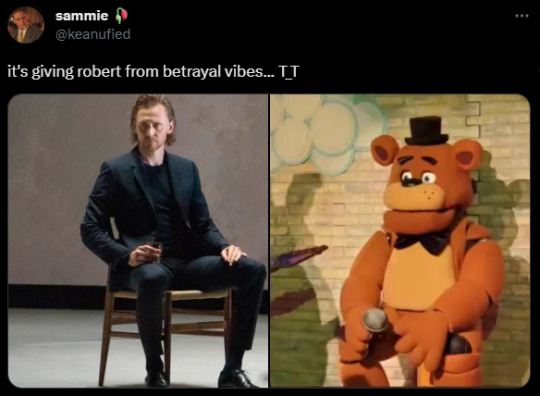
no but fr he did look like he's going through a tough time
#tom hiddleston#betrayal#harold pinter#fnaf#five nights at freddy's#charlie cox#zawe ashton#betrayal play
12 notes
·
View notes
Text
need to change my theme in like three days but idk what i’m gonna change it to bc i’m basically just hyperfixated on whatever that boy is doing at the moment*
*FLASHING DISCLAIMER COMES UP ON SCREEN BUT THE TEXT KEEPS CHANGING TOO FAST TO REALLY UNDERSTAND WHAT ITS DISCLAIMING
#hope this helps#i think i might have a pinter theme for a minute actually#not too long but i think there might be some Really great quote pulls from moonlight#i’m like. fine. but i also feel like i’m gradually losing it#second semester sure does have its patterns huh. je-sus christ#sort of get viscerally obsessed w a guy and some sort of theater thing ever year. usually what we’re working on but last year was a minor#- exception bc of how absolutely miserable my program was making me. back at it tho#OH orrr i might do a julius caesar theme actually. can’t stop thinking about them#i think i might make all of the actors curated character playlists . yes i currently have character playlists but those are 4 the adaptation#also listening to his macduff playlist & literally every song that comes on is making me go jesus christ but in a different way.#like he’s right but. girl#do u like when i combine five posts into one by not shutting up in the tags be honest#ted talks#🗡️
5 notes
·
View notes
Text
✧UNLOCKING MORE OF HER || percy jackson x fem!reader
part one!
part two!
part three!
part four!
part five!
summary: percy jackson’s first days on camp were hell to say the least—fist day and he got bullied, but when he sneaks away to be alone he finds an interesting girl in the forest.
word count: 3013!
warnings: small curses (literally like one word and it’s not really a curse but it’s considered one) reader is daughter of athena, sister of annabeth, horrid flirting, reader lowkey not felling percy for the first half’s of this story line.
a/n: guys, i def think im like dragging this out to be a slow burn to like don’t hate me HEHEHEHAHAHA
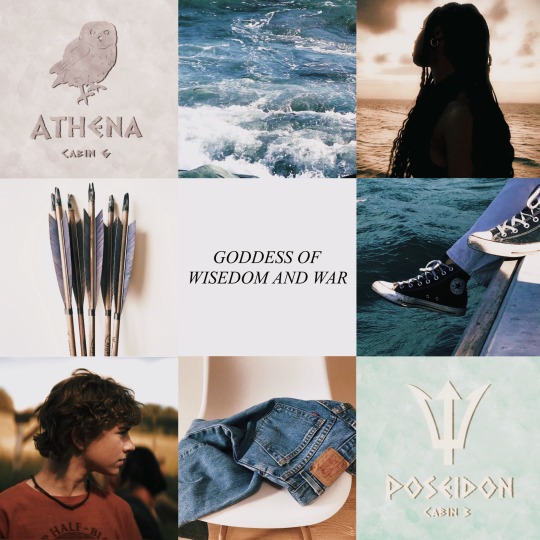

when the day had just begun, percy was so nicely and beautifully woken up with his clothes being thrown into the wet mud by clarisse and her goons. they snickered as they threw us and made sure to twist their feet that laid upon them.
‘oh grate..yeah thanks for the painting on the shirt guys i’ll be sure to give you creds whenever someone asks where i got it’ percy pinter down at the first where his shirt laid that was once orange and was not poopoo brown.
clarisse seemed to be unhappy with the fact he wasn’t shaking in his boots and made her way over to him, shoving him into the mud right where his shirt was painted. grunting as he his the floor, percy looked up at the three of them.
‘dont think you're such a big deal just because you claimed you slayed the minotaur…i still don’t believe you did.’ she smirked down at him as percy kept his quiet, his eyes trained to look up at her.
sneaking she went to signal her followers to do more to his face—perhaps throw mud on it until they heard a stern voice speak behind them.
‘clarisse!’ she shouted.
percy pushed his led up with his arms that laid behind him in the mud, seeing it was y/n he felt the weight of the world set upon his shoulders. his face filled with red from the embarrassment that was unfolding. it just had to be her?
he wouldn’t mind criticism from grover or luke…or even annabeth? but y/n?
looking as she made eye contact with him, percy turned his head with embarrassment and she felt herself feeling a bit of pity for him. sighing with her eyes closed she folded her arms over her chest, her signature pose.
‘don’t you have places to be? other than pushing someone that’s not even your age into the mud to make yourself feel better at the fact nobody has paid attention to you since he git here? jealous are you?’ y/n looked clarisse up and down who scoffed and angrily as she bit the inside of her cheek.
‘let’s go.’ she demanded her goons who stood behind her. they shoved themselves past y/n who moved her shoulder before any of them could check her.
y/n turned to make sure they fully left them, she didn’t have the time to be pushed into the mud this morning unlike percy who shamefully laid down into the mud, accepting his fate.
y/n walked over to percy who looked up through his eyelashes and she looked down at him with only her eyes.
‘aren’t you going to get up? or are you going to sit there and look sad.’ she mumbled as percy looked around and scrambled his way up to eyes hight with y/n who stayed connected to his own.
‘i was going to get up…right when you walked in actually…’
she looked at his clothes as face before straightening her back and head. what percy didn’t expect was for her to reach out and rub the dry splatter of mud on his cheek that he failed to notice was there. his eyes followed her soft hand that rubbed at the hardened dirt. she looked at the rest of his face before humming to herself.
she didn’t say anything else to him, all she did was turn around and walk away from where percy stood. he was purely shocked, but nonetheless. he watched her walk away back to wherever she was really going.
that must have been a sign…it had to be a sign, today he would learn at least one thing about y/n.
ㆍ୨୧ㆍ
as percy swung his sword at luke who dodged and turned, percy grew to accept the fact that every time they dueled it was a never ending repeat of who will win and who will be shamefully walking away to their cabin.
if nobody could tell the one winning would obviously be luke…the one going back to his cabin, would be percy.
‘come on! you can do it—‘
‘no no i can’t!’ percy grunted as he dodged some of luke’s attacks, occasionally getting a good swing in on luke here and there.
‘yes you can! we’ve been doing this since you got here, come on!’ luke encouraged as he pushed his sword over percy’s. the two of them coming into contact as he twisted the sword making it look easy.
percy may get lucky just now? maybe it will finally happen—
‘luke!’ she called out.
percy immediately looked away from luke who saw this as an opportunity and swung his sword at percy making him stumble and fall.
landing right on his back, percy blinked in surprise as he exhaled.
‘oh!’ luke laughed. making his way over to percy who laid on the ground.
‘never take your eyes off of your opponent’ he mumbled to percy who rolled his eyes. luke laughed and pulled out his hand to help percy up who accepted the help and let out a small thanks.
just then he remembered who was actually there. his eyes turning to her immediately, y/n stood, looking at the two boys who looked at her waiting for her to speak.
‘uhm…sorry to interrupt your bonding, but luke your needed at cabin five. some teens are disagreeing and there’s a small fight bound to happen’ y/n warned luke who stood there and rolled his eyes at the immaturity shining though.
‘right…uhm—thanks for telling me n/n’ he placed his sword into its holder on his hip and started to walk but before he fully left he stumbled over to y/n, his hand on her shoulder.
‘oh and please y/n, take him to the bows and train him. i was supposed to but y’know…’ luke gave her a pleading look as she went to intervene but soon gave up when luke looked into her eyes for a bit longer.
percy watched the two of them, his eyes trained on luke’s hand that didn’t leave y/n’s shoulder. he felt his hand flatten against his jeans as he looked up and down at the two of them before clearing his throat.
y/n turned to luke who looked away into the distance as she sighed in defeat.
‘fine…but if this is a thing, i promise—‘
‘i’ll never see the light of day again. i know i know, you're the best!’ luke shouted as he hurried to cabin five.
percy looked at y/n who shook her head at luke.
she wore something more casual as of right now than he saw her in earlier. when he saw her last, she wore more loose pants and a sweatshirt. but now she wore washed out blue jean shorts and the casual orange camp shirt that said camp half blood on it.
her shoes were high top converse like his own, her hair in a half up half down like annabeth’s and her usual necklace full of earned beads to show off. clearing his throat once more in the awkwardness of him just looking at her, unbeknownst to percy, y/n did the same.
‘so—‘ just before he could say anything else she turned her heel and began walking. percy took this as a small sigh and hurried his walk to be right behind her.
‘uh-uhm, i just wanted to thank you for earlier, when you told clarisse and her goons off’ percy looked over at y/n who turned her head a bit to hid the small snicker that failed to be held within her—he succeeded at seeing another emotion from y/n other than serious, dark and mysterious.
‘yeah it’s whatever…don’t mention it’ she mumbled while they cut their way through small groups of people who stood and talked or groups of people who walked by.
‘yeah but i feel like i need to…and i still wanted to thank you for helping me out of the forest the other night? you never let me—‘
‘i’m serious…percy.’ she turned her face to him, her footsteps stopping as she turned her head to him. their eyes connecting, blue meeting (e/c) as she held their eye contact—‘don’t mention it’ y/n finished.
percy nodded his head as the two of them continued to walk their way to the bows and arrows.
ㆍ୨୧ㆍ
‘pick your bow, and get down arrows. get enough so that if and when you fail, you’ll have some to back it up’ y/n spoke boldly ad the two of them stood alone.
luke so happened to pick a day when most of the cabins would be doing other training other than bows and arrows. y/n and percy had the small place alone.
no others. just them alone. together.
‘i won’t fail—‘
‘they all say that’ she shrugged her shoulders as percy rolled his eyes and grabbed the arrows with his bow in hand.
once he got himself ready with the bow gripped in his hand and the arrow in his other.
y/n stood next to him, her figure not to far from his.
‘arms up’ she instructed. percy did just that. his eyes staying focused but his mindset focused on her—he didn’t know what it was but he found it a bit difficult to work properly and concentrate with her near him.
‘place the arrow on the bow and aim for the middle, if you can’t that’s fine, but i would be impressed if you ca make it into the middle’ she folded her arms over her chest like always as she waited for percy to shoot his shot at the red dot sitting on the target in front of him.
breathing out he looked to his backside where he was and mumbled—‘what if i can’t make it into the middle like you want?’ he asked. worried for her answer but ready for it.
she bit her lip a bit to make sure her answer was right. quaking up her eyebrows as she shrugged she began to speak—‘there are no what if’s…there are just doing. don't be worried about what others want from you. do what you want.’
she looked at him in his eyes as he looked down into the grass.
what could she possibly mean? how did that even answer his question…to be fair it answered some of it but not all of it. could her response be related to how she feels? could this be his opportunity to learn something about her?
‘okay…right’ he mumbled. she looked ahead while waiting for him to take his shot. percy prepared himself before pulling back his arms and shooting the arrow.
it flew into the air…it flew straight. could he get it? could this be his moment to empress y/n?
watching anxiously as time seem to slow he watched his arrow go straight, straight and soon straight into the dirt that laid behind the standing target.
‘hm…’ y/n mumbled making percy turn to her.
‘i almost had that! it must be the wind—‘
‘there is no wind today…it’s perfectly sunny, no clouds’ y/n looked up at the sky, prompting percy to do the same who of course did as he saw she was right. not a cloud in sight.
‘i—i wasn’t ready’
‘there’s more arrows…make yourself ready. there might come a time where your put up to something and you need to be ready’ she told him.
percy frowned his eyebrows once more and looked at her as he let his arms drop to his side—‘okay, what is up with you and these instagram superhero quotes or something? why do you keep telling me these things?’
‘telling you what things?’ she tilted her head a bit while looking at percy who scoffed.
‘might come a time, need to be ready?there are no what if’s—who says that?’
‘…me?’ she frowned, her eyes bows.
‘obviously you but why? why do you keep telling me these things?’ percy waited for a answer as he was only met with a small smile from y/n.
she walked her way over to him and fixed the beads on his necklace that laid atop his shirt.
‘your beads are in the wrong order…ones chipped?’ she changed the subject, of course. but she was talking, and that’s all the mattered in the moment.
‘i fell—‘
‘you were pushed?’
‘same thing.’ percy mumbled. y/n scoffed a bit while patting his heads over his neck.
‘you can get a new one y’know? if you're not happy with that one’ she looked him in the eyes before he nervously looked away and back at her.
‘i’m okay with it, it’s not like they’re gold or something’ y/n blinked at his response and hummed.
percy couldn’t help but look down at her own beads and saw the fact she had plenty…probably more than annabeth and luke. she had one that looked rare, the rest like the others. her and her shared at least two of them. he still had some time to go.
‘i tell you these things because somebody wasn’t there to tell me…we’re the same age i know, but that doesn't mean anything. i can still tell people things i wished were told to me’ she mumbled.
percy felt his eyes soften at her words and his hands loosen around the arrow that was once tight in his hand.
she wished someone told her the things he’d been telling here? could they be more similar in ways he didn’t know? just then it hit him. he learned something small about y/n. one down plenty to go.
‘wait—weren’t you supposed to train me today? i don’t think i’m well with an arrow yet, and i hear you're pretty good?’ percy tried to make y/n stay after seeing she tried to make her leave.
y/n had her back turned before she turned his way and looked him up and down—‘i couldn’t stay for long, i have others to train…i’ll train you tomorrow morning, i’ll tell luke he can have you in the evening. you better be ready, i don’t go easy’ she told while turning away from percy who stood his spot in the middle of the grass.
she wanted to see him tomorrow.
well…not like that. it’s for training but she didn’t have to offer it, but she did. so? this could mean something.
ㆍ୨୧ㆍ
‘it has to mean something right?’ percy stressed to grover who groaned while he threw his head back into the bed.
percy’s thoughts raced over and over, could she want to see him? did she want to see him? did she possibly want to know about him just as much as he felt the need to know about her? was this a prank? because if so it wasn’t funny.
after percy had found himself useless in forgetting about it at lunch he rushed us way to grover who had happened to be in his cabin resting. reading a book, with his pajamas on. his day was peaceful until percy threw himself into his cabin like a mad man.
he had been talking to grover about y/n for the past thirty minutes now, non stop.
‘i don’t know…maybe?’
‘but what if it doesn’t mean anything and she’s truly just trying to be a good friend right? wait….do you think she thinks of me as a friend?’ percy had a whole new possibility pop into his head.
‘maybe?’ grover mumbled while holding his head in his hands.
‘maybe? grover! maybe isn’t a answer right now, i really need your help and expertise! you know her right? your like twenty something so you definitely know her, how did she become your friend? how long did it take?’
‘like…two years? i don’t know, she’s reserved and very secretive, very stealthy too’
‘i know, it’s almost like she’s always around without me knowing which is kind of cool and kind of scary’ grover smiled and nodded at this before percy once more continued his speech.
‘but you didn’t answer my other question? how did she become your friend?’
grover wittingly looked up into the ceiling before letting out a breath as he thought.
‘uhm…i don’t know? i just…one day i guess she called me g for the first time as my nickname then after that she started to talks to me a lot more and joke with me?’
‘so, she didn’t really have a way to become your friend she just did?’
‘yeah i guess?’ grover shrugged as percy threw his head back into the bed, his hands over his eyes.
‘this isn’t helping at all grover!’ he whined into his hands as grover laughed and shrugged once more.
‘dude i don’t know im sorry! did you talk to luke?’
‘of course i did, he basically said the same things you're saying…’ percy sat up with a helpless look on his face.
grover felt himself feeling a bit bad and being unhelpful to percy and helping him understand probably one of the most hardest things to understand which was y/n.
grover let an idea pop into his head—
‘listen…she likes (f/f) and (f/c) try like…showing it off as you eat it at breakfast tomorrow and wear your one (f/c) jacket tomorrow, that might get a bit of her attention.’ grover explained while percy nodded.
‘—and if it doesn’t talk to her as you guys train, talk about new york, she’s always wanted to go. talk about anything that she might like…try to make tomorrow about her and maybe you might get five steps into her three hundred doors of being officially her friend’
grover explained slowly and lowly to percy who absorbed everything that he was being told. remembering everything he nodded his what and smiled a bit at grover.
‘thanks grove’ you really do help when you want’ percy teased him as he rolled his eyes—‘i help all the time don’t act like i don’t’ percy laughed making grover do the same.

taglist:
@ifilwtmfc
#percy pjo#percy series#percy jackson#percy jackson x reader#percy jackon and the olympians#annabeth chase#grover underwood#luke castellan#x reader
364 notes
·
View notes
Note
“No one here calls people”
Imagine if they did though? Who would be the most insufferable? The most fun?
(I’m picturing Breg being a clingy bf who calls ALL the time. Especially when you’re out at work. Grimby and Fank-E spamming your phone with memes that you hate. Sending nudes to Santi or Vesper with a “come find me” attached”)
I meant that more as a joke, many of them do have phones and they will call you. Point is, when their five minutes of hysteria kick in, a phone call just isn't enough.
Be grateful that Breg can't write well enough to text you anything barely sensical. But he will call you, constantly. He doesn't like being alone in the house and he doesn't like letting you roam without knowing exactly where you are naturally.
Many others will call you out of controlling urges, such as Pinter, Morell and Grimbly, Mervin, Livius and Cero. All of them with their own "modus operandi" of sorts.
Fank-e is the reason your phone is silenced most of the time.
It's also very bold of you to not immediately assume Santi and Vesper are the ones sending you nudes. Everytime you get a message from Santi, you've learned the hard way not to open it in public, because if it isn't him in a brand new depraved angle, then it could be audio of him fucking himself to the thought of you. And that's going to make for a very awkward bus ride. Vesper, on the other hand, is very much into the written side of sensuality. He likes sending you blocks of obscene text to plant all sorts of ideas in that little head. Not that you won't get the frequent cunt throb of an image along with it...
131 notes
·
View notes
Text

The word “great” is somewhat promiscuously applied to actors. But it was undoubtedly deserved by Sir Michael Gambon, who has died aged 82 after suffering from pneumonia.
He had weight, presence, authority, vocal power and a chameleon-like ability to reinvent himself from one role to another. He was a natural for heavyweight classic roles such as Lear and Othello. But what was truly remarkable was Gambon’s interpretative skill in the work of the best contemporary dramatists, including Harold Pinter, Alan Ayckbourn, David Hare, Caryl Churchill and Simon Gray.
Although he was a fine TV and film actor – and forever identified in the popular imagination with Professor Albus Dumbledore in the Harry Potter franchise – the stage was his natural territory. It is also no accident that, in his private life, Gambon was an expert on, and assiduous collector of, machine tools and firearms for, as Peter Hall once said: “Fate gave him genius but he uses it as a craftsman.”
Off-stage, he was also a larger-than-life figure and a superb raconteur: a kind of green-room Falstaff. I have fond memories of an evening in a Turin restaurant in March 2006 on the eve of Pinter’s acceptance of the European Theatre prize. Gambon kept the table in a constant roar, not least with his oft-told tale of auditioning for Laurence Olivier as a young actor in 1963 and cheekily choosing to do a speech from Richard III; but the next night Gambon gave an explosive rendering of Pinter’s poem American Football that threatened to blow the roof off the Turin theatre.
However, Gambon’s bravura was also mixed with a certain modesty. In the summer of 2008 I met him for tea in London and found him eagerly studying the script of Pinter’s No Man’s Land, in which he was scheduled, several months later, to play Hirst. He told me that he had started work on it so soon because he found it difficult to learn lines at his age.
“Sometimes,” he said, “I sleep with a script under my pillow, or just carry it around in my raincoat pocket, in the hope the lines will rub off on me.” I think he was genuine; but with Gambon, one of life’s great leg-pullers, you were never entirely sure.
Gambon achieved greatness without either the formal training or genetic inheritance that are often considered indispensable.
He was born into a working-class Dublin family that had no artistic background; his mother, Mary (nee Hoare), was a seamstress, and his father, Edward, an engineer. When the family settled in Britain after the second world war, the young Gambon went to St Aloysius school for boys, in Somers Town, central London. On leaving at the age of 15 he signed a five-year apprenticeship with Vickers-Armstrongs, leading to a job as a tool-and-die maker. With his mechanical aptitude, he loved the work. But he also discovered a passion for amateur theatre and, having started by building sets, eventually moved into performing. “I want varoom!” he once said. “I thought, Jesus, this is for me.”
With typical chutzpah, he wrote to the Gate theatre in Dublin, creating a fantasy list of roles that he had played in London, including Marchbanks in Shaw’s Candida; in the end, he made his professional debut there in 1962 as the Second Gentleman in Othello. His best decision, however, on returning to London, was to sign up for an improvisational acting class run by William Gaskill at the Royal Court.
Gaskill was about to join the newly formed National Theatre company at the Old Vic and recommended Gambon for an audition: hence the celebrated story of Gambon’s first encounter with Olivier, which ended with the young actor, in his excess of zeal, banging his hand on a nail in an upstage column and bleeding profusely. Far from being the nail in Gambon’s coffin, this led to a productive four years with the National in which he progressed from walk-ons to substantial roles such as that of Swiss Cheese in Gaskill’s revival of Mother Courage.
On Olivier’s advice, however, Gambon left the National in 1967 to hone and pursue his craft at Birmingham rep – a shrewd move that saw him, at the astonishingly early age of 27, playing his first Othello. He moved on later to the Royal Shakespeare Company, and in 1968 made his first foray into television with the leading role in a BBC adventure series called The Borderers.
However, it was through working on another TV series, The Challengers, that he made a contact that was to transform his career. His fellow actor Eric Thompson was moving into directing, and in 1975 was set to do an Ayckbourn trilogy, The Norman Conquests, at the Greenwich theatre. He cast Gambon, against type, as a dithering vet.
He revealed, for the first time, his shape-shifting gifts; and the sight of him, seated at a dinner table on a preposterously low stool with his head barely visible above the table’s edge, remains one of the great comic images of modern theatre.
This led to a highly productive working relationship with Ayckbourn including key roles in Just Between Ourselves (Queen’s theatre, London, 1977) and Sisterly Feelings (National, 1980).
At the same time, Gambon began an association with Gray by taking over, from Alan Bates, the role of the emotionally detached hero in Otherwise Engaged (Queen’s theatre, 1976).
That was directed by Pinter, for whom in 1978 Gambon created the part of Jerry in Betrayal at the National. It was a production beset by problems, including a strike that threatened to kibosh the first night, but Gambon’s mixture of physical power and emotional delicacy marked him out as a natural Pinter actor. That power, however, manifested itself in the 1980s in a series of performances that staked out Gambon’s claim to greatness.
First, in 1980, came Brecht’s Galileo at the National: a superbly triumphant performance that brought out the toughness, obduracy and ravening intellectual curiosity of Brecht’s hero. It was a measure of his breakthrough that, as Gambon returned to his dressing room after the first night, he found the other actors in the National’s internal courtyard were shouting and roaring their approval. Two years later, Gambon returned to the RSC to play both a monumental King Lear and a ravaged Antony opposite Helen Mirren’s Cleopatra.
But arguably the finest of all of Gambon’s 80s performances was his Eddie Carbone in Arthur Miller’s A View from the Bridge, directed by Ayckbourn at the National (1987). It helped that Gambon actually looked like Miller’s longshoreman-hero: big and barrel-chested with muscular forearms, he was plausibly a man who could work the Brooklyn docks.
Gambon also charted Eddie’s complex inner life through precise physical actions. He stabbed a table angrily with a fork on learning that his niece had got a job, let his eyes roam restlessly over a paper as the niece and the immigrant Rodolpho quietly spooned, and buckled visibly at the knees on realising that a fatal phone-call to the authorities had ensnared two other immigrants. In its power and melancholy, this towering performance justified the sobriquet once applied by Ralph Richardson of “the great Gambon”.
When you consider that the decade also saw Gambon playing the psoriasis-ravaged hero of Dennis Potter’s TV series The Singing Detective (1986), you realise his virtuosity and range.
And that became even clearer in 1990 when he played the mild-mannered hero of Ayckbourn’s Man of the Moment (Globe theatre, now Gielgud, London), had another crack at Othello for Ayckbourn in Scarborough and appeared, in 1989, as a romantically fixated espionage agent in Pinter’s TV adaptation of Elizabeth Bowen’s The Heat of the Day: that last performance, alternately sinister and shy, was one of Gambon’s finest for television and deserved a far wider showing.
In later years Gambon successfully balanced his stage career with an amazingly prolific one in film and television. In Hare’s Skylight at the National in 1995 he combined the bulk and weight of a prosperous restaurateur with a feathery lightness – a skipping post-coital dance across the stage with the balletic grace often possessed by heavily built men.
Gambon was equally brilliant as a disgusting, Dickensian, accent-shifting Davies in a revival of Pinter’s The Caretaker (Comedy theatre, 2000), as a perplexed bull of a father in Churchill’s A Number (Royal Court, 2002), as a Lear-like Hamm in Beckett’s Endgame (Albery, 2004) and as a brooding, alcoholic Hirst in Pinter’s No Man’s Land (Duke of York’s, 2008). Even if Gambon’s Falstaff in a 2005 National Theatre production of Henry IV Parts One and Two did not quite match expectations, his work for the theatre revealed an ability to combine volcanic power with psychological depth and physical delicacy.
Ill health and increasing memory problems forced him to retire from stage acting in 2015, but not before he had given memorable performances in two Beckett plays: Krapp’s Last Tape (Duchess, 2010) and All That Fall (Jermyn Street theatre, 2012), where he played, opposite Eileen Atkins, the sightless but stentorian Mr Rooney.
He also continued to work in television and film for as long as possible. He belied the whole notion of the small screen by giving large-scale performances as the black sheep of a big family in Stephen Poliakoff’s Perfect Strangers (2001) and as a reclusive plutocrat in the same writer’s Joe’s Palace (2007).
He was nominated for awards for his performances as Lyndon Johnson in an American TV movie, Path to War (2002), and as Mr Woodhouse in a BBC version of Jane Austen’s Emma (2009). Later TV series included The Casual Vacancy (2015), Fearless (2017) and Little Women (2017).
In film, he had a rich and varied career that ranged from the violent hero of Peter Greenaway’s The Cook, the Thief, His Wife and Her Lover (1989), to a heavyweight mafia boss in Mobsters (1991), the aged Lord Marchmain in Brideshead Revisited (2008), a cantankerous old director in Dustin Hoffman’s Quartet (2012) and the bearded Hogwarts headteacher (whom he privately referred to as “Dumblebore”) in six of the eight Harry Potter films, taking over the role for Harry Potter and the Prisoner of Azkaban (2004) following the death of Richard Harris.
He also provided the narration for the Coen brothers’ Hail, Caesar! (2016) and voiceovers for the two Paddington films (2014 and 2017).
But Gambon brought to everything he did, in life as well as art, enormous gusto, a sense of mischief and a concern with precision: he was almost as happy restoring old firearms as he was working on a new role.
In 1992 he was appointed CBE, and six years later was knighted.
He married Anne Miller in 1962, and they had a son, Fergus. From a subsequent relationship with Philippa Hart, whom he met on the set of Gosford Park, he had two sons, Michael and William.
He is survived by Anne and his three sons.
🔔 Michael Gambon, actor, born 19 October 1940; died 27 September 2023
Daily inspiration. Discover more photos at Just for Books…?
52 notes
·
View notes
Text
my birthday weekend 😁 (it’s on sunday but im currently pretending that 25 - the big two-five - is a big birthday so I’m dragging it out) anyone want to come announce their love to me at the harold pinter before the macbeth matinee
5 notes
·
View notes
Text
Theatre Deep Dive: David Tennant in 'The Real Inspector Hound/Black Comedy' (1998)
For today's dig into DT's theatre career, let's have a chat about the 1998 double-billed plays The Real Inspector Hound and Black Comedy, shall we? They're a bit special because these were the plays which introduced David to Gregory Doran. Doran was at the director's helm for both.
I have the programmes for the play's Richmond Theatre and Comedy Theatre runs...oh, and just so you know, The Comedy Theatre is now called the Harold Pinter Theatre (the theatre where David did his production of Good.) Anyway, these two photos are the front cover and the cast list from my Comedy Theatre programme:

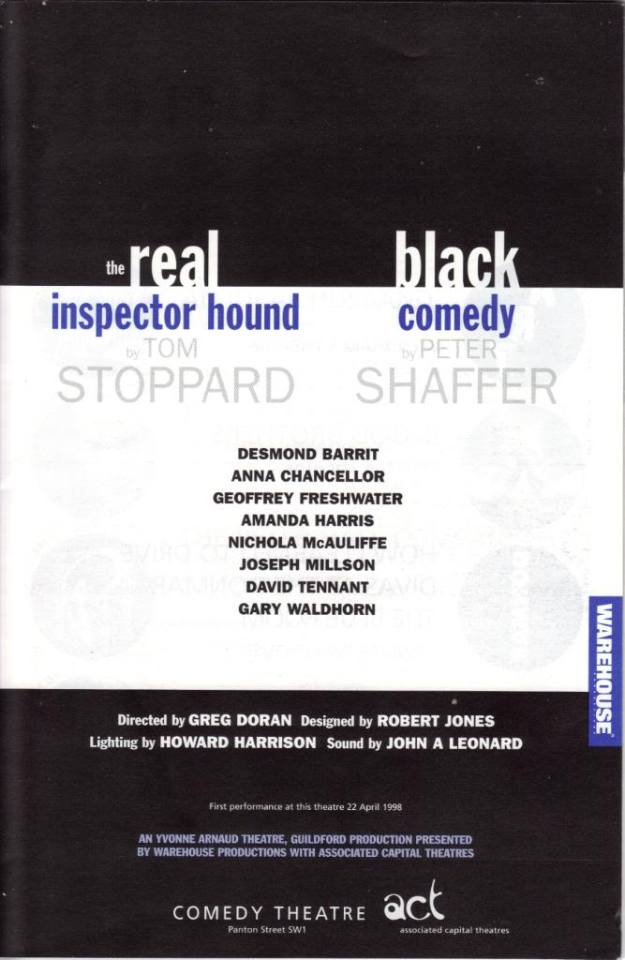
Programme: The Real Inspector Hound/Black Comedy, The Comedy Theatre
Sadly, I'm missing the programme for the production's run at the Yvonne Arnaud Theatre -- my hunt continues! -- but I do have the programme for the play's Richmond Theatre run. I find it fascinating as well as beneficial to collect the programmes for all parts of each production's run, since many of the programme details (including such things as cast lists and the works listed in each actor's biography) can change from venue to venue. To see this in action, here are the front cover and the cast list from my Richmond Theatre programme of the production:

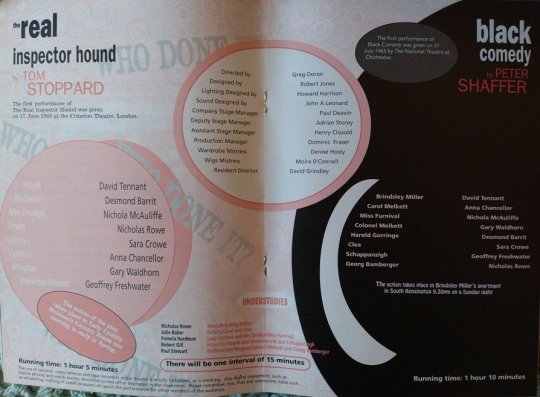
Programme: The Real Inspector Hound/Black Comedy, Richmond Theatre
Now back to the plays, and their particulars.
Peter Shaffer's Black Comedy and Tom Stoppard's The Real Inspector Hound were two one-act satirical plays from the 1960s with many similarities. Both were farcical and played off comic stereotypes: The Real Inspector Hound targeted theater critics and an Agatha Christie-style crime thriller, and Black Comedy aimed for one-dimensional "Clue"-like characters getting into trouble in slapstick physical comedy. Both also had five men and three women in the cast.
The production opened at the Yvonne Arnaud Theatre in Guildford for press night on 25 March 1998. It moved to the Richmond Theatre for a 7 April to 11 April 1998 run, and then to the Comedy Theatre (now the Harold Pinter) on 22 April 1998. At that venue it was extended from its initial end date of 11 July, and ran through 8 August 1998. The show ran 2 hrs and 40 minutes long: The Real Inspector Hound clocked in at 1 hr and 5 minutes, then a 20 min interval, and then Black Comedy ran 1 hr and 10 minutes.
Even though all the reviewers at the time went on and on and bloody ON about how these two plays had never been produced together, I've found that's not quite accurate. A production of the two plays was staged in 1996 by London's Millfield Theatre Company:

So to my knowledge, that's the only other time prior to Doran's production.
Anyway, Doran let the same set of actors play two different sets of comic stereotypes in two separate situations, and chose to keep both plays set in their original 1960s settings instead of bringing them into the present.
Now - on to the plays!
The first play of the evening, The Real Inspector Hound, saw David play a self-obsessed, downtrodden theatre critic named Moon. It's a play within a play - one is a parody of the Agatha Christie country-house type thriller, and the other a study in wish-fulfillment, showing how a couple of theatre critics are drawn inexorably into the play.
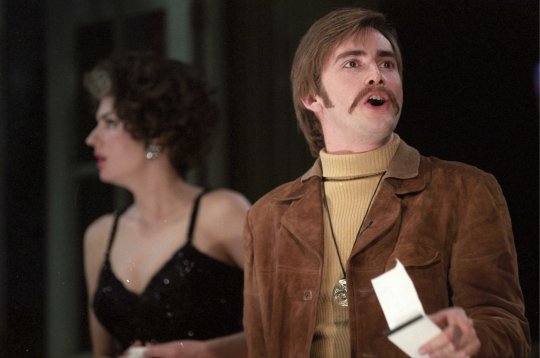

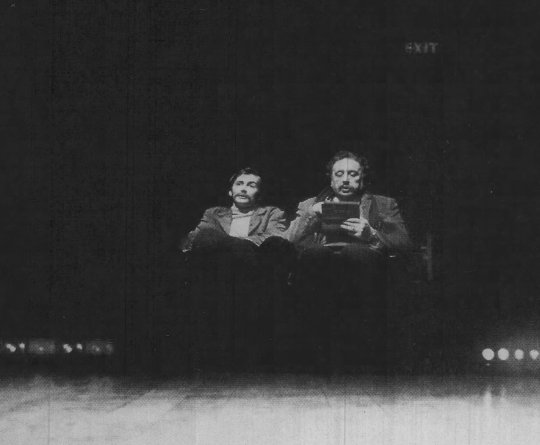
David Tennant as Moon in The Real Inspector Hound, 1998
Moon - along with his fellow critic Birdboot - start watching a country house thriller in order to review it. But Moon can't stop harboring murderous thoughts of his own. He's a second-rate critic, and he knows he'll never get out from under the shadow of the senior reviewer. Meanwhile, the thriller the two critics are watching starts unfolding in front of the audience's eyes, and Moon and Birdboot - who at the start of the play are behind the action - slowly keep moving towards its center. Stoppard takes the fantasy of wondering what it would be like to get up and join the action by breaking down the wall between stage and auditorium, following it through to a fatal piece of audience participation and a nightmarish conclusion.
Surreal!
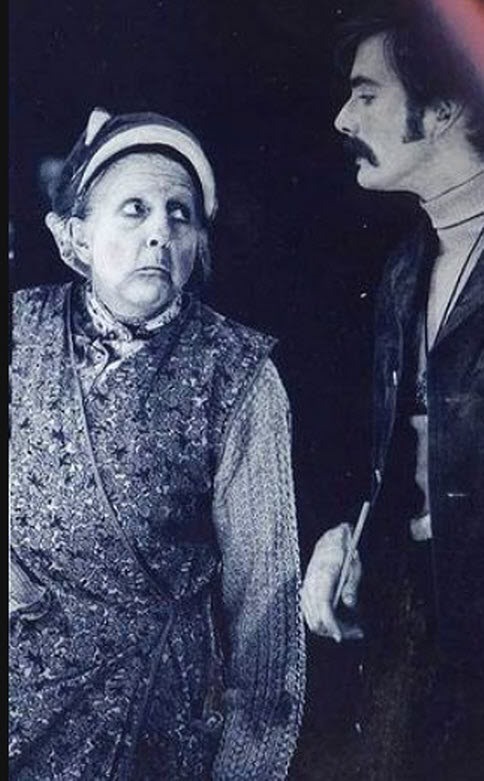
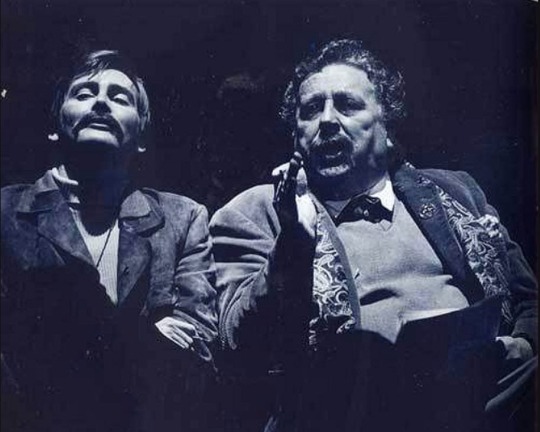
David Tennant as Moon in The Real Inspector Hound, 1998
Then came the interval, and afterwards came Black Comedy. Shaffer titled it after its clever and unique contrivance: the stage is fully lit to see characters when they're "in the dark," and the stage goes dark when the action is supposed to take place in normal light. So when the curtains open the stage is cloaked in darkness, and when the characters talk about a party they're about to give and then mention a blown fuse, the stage lights go on. But for the ~characters~ it's now dark, so they begin to fumble and feel their way about. Very clever indeed!
David played Brindsley Miller, a young beatnik sculptor living in a flat in South Kensington. Brindsley had "borrowed" a lot of posh art and furniture from a gay neighbor who'd went on holiday and placed it in his own flat in order to impress both the deaf German millionaire who wishes to look at his work and his fiancee Carol's father, the Colonel, who'll he'll be meeting for the first time. But Brindsley's web of deception begins to catch up to him when his neighbor returns home early and joins the party.
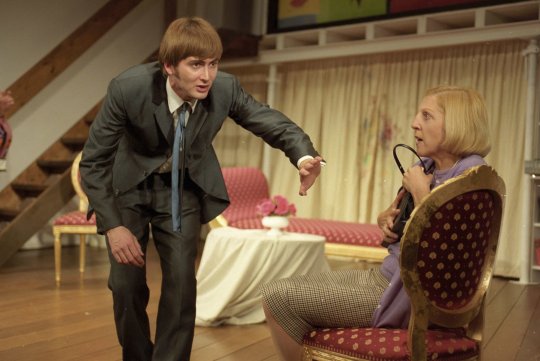
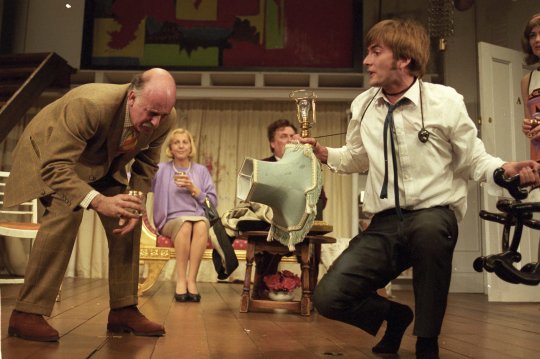
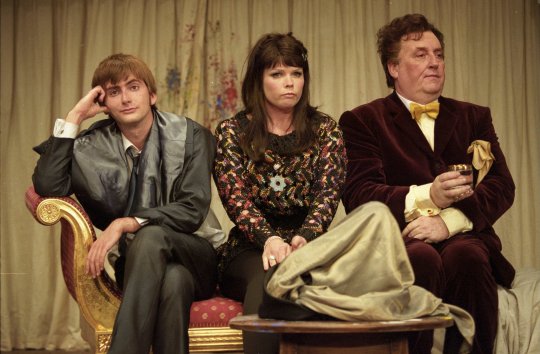
David Tennant as Brindsley in Black Comedy, 1998
Poor old Brindsley has to return everything he borrowed...without anyone knowing. In the dark! But then it gets worse. The longtime girlfriend Brindsley recently broke up with (but is still in love with) walks in. And his gay neighbor, Brindsley learns, is also in love with him! And soon a spinster drinking herself silly, a man from the electricity board, and the aforementioned deaf German millionaire join the party. And everyone is jealous. And there are a lot of tantrums.
And Brindsley gets his ear twisted.
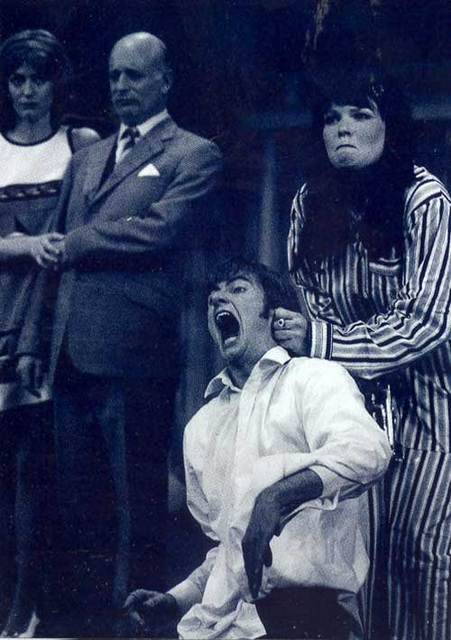
David Tennant as Brindsley in Black Comedy, 1998
David - and the plays - got a slew of positive reviews! Black Comedy's breakneck pacing, near-misses and pratfalls made it a perfect vehicle for David's athletic and comedic acting. For his role as Brindsley, David was called "for all the world a young Davy Jones in his two-tone suit."
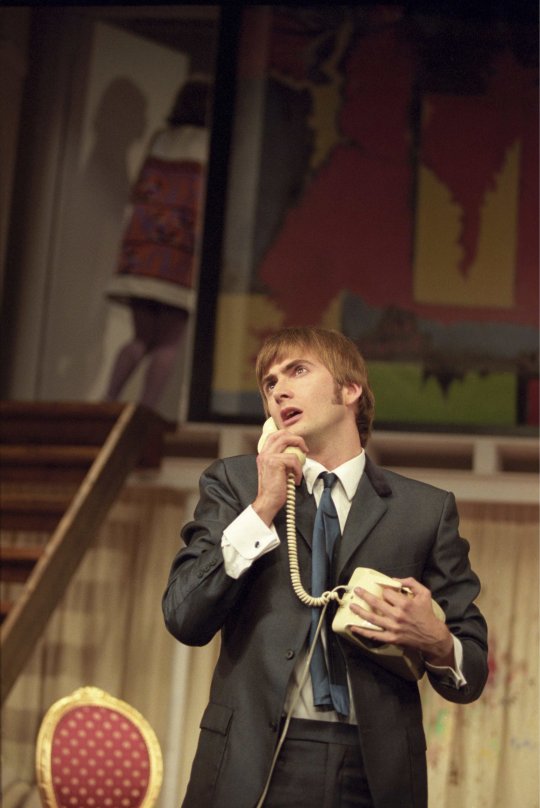
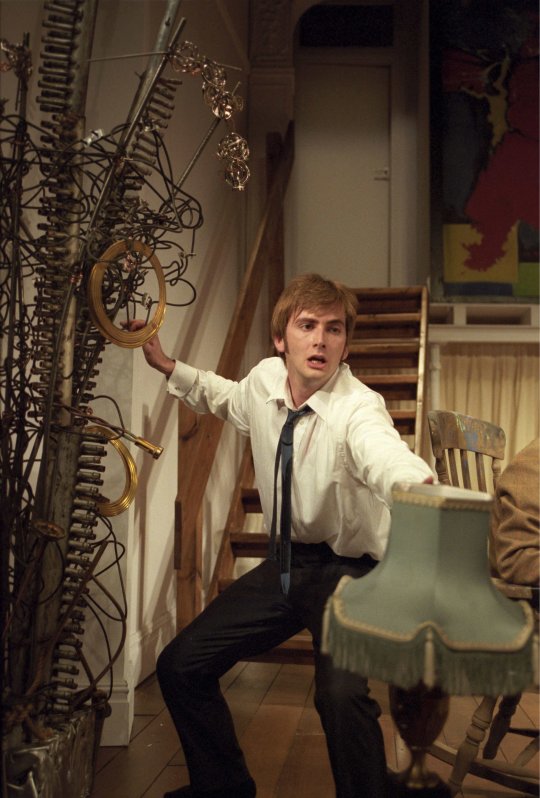
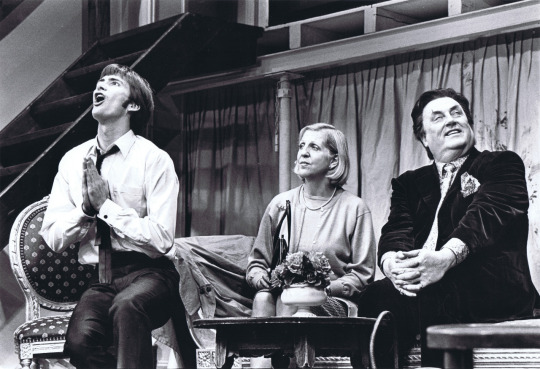
David Tennant as Brindsley in Black Comedy, 1998
Other reviewers said David had "all the sweaty desperation of the farceur," was "splendidly agile," and offered "a virtuoso demonstration of physical farce-playing." Yet another reviewer said, "No one works harder than David Tennant…this is inspired clowning as he fumbles his way about spreading confusion all around." And one even went so far as to say David was highly promising and "strongly recalled Michael Crawford, who played the role on Broadway, as the hapless and increasingly hysterical Brindsley."
For his role as Moon in The Real Inspector Hound, David was "particularly fine, all slumped angular embitterment as the aggrieved second-string critic." Another said the role was "beguilingly and plausibly played," and another that he "shin[ed] as the ever more deranged Moon."
I wish I could've seen these. As far as I know, no recordings of this production (video or audio) were ever made. *sigh*
And that, my friends, is a wrap!
18 notes
·
View notes
Text
Birthdays 10.10
Beer Birthdays
Patrick Perkins (1838)
Walter Jerome Green (1842)
George W. Schimminger (1857)
Barbara Groom (1946)
Thomas Cizauskas
Five Favorite Birthdays
Brett Favre; Green Bay Packers QB (1969)
Thelonius Monk; jazz pianist (1917)
Maurice Prendergast; artist (1858)
John Prine; folk singer (1946)
Bradley Whitford; actor (1959)
Famous Birthdays
Henry Cavendish; chemist, physicist (1731)
James Clavell; writer (1924)
Peter Coyote; actor (1941)
Paul Creston; composer (1906)
Dale Earnhardt Jr.; automobile racer (1974)
Jessoca Harper; actor (1949)
Helen Hayes; actor (1900)
Chiaki Kuriyama; Japanese actor (1984)
Bai Ling; actor (1966)
Gavin Newsom; politician (1967)
Jodi Lyn O'Keefe; actor (1978)
Chris Penn; actor (1965)
Harold Pinter; English writer (1930)
Nora Roberts; writer (1950)
David Lee Roth; rock singer (1955)
Robert Gould Shaw; Civil War soldier (1837)
Julia Sweeny; actor, comedian (1959)
Tanya Tucker; country singer (1958)
Midge Ure; Scottish rock musician (1953)
Giuseppe Verdi; Italian composer (1813)
Ben Vereen; actor, dancer (1946)
Jean-Antoine Watteau; French artist (1684)
Benjamin West; artist (1738)
Ed Wood; film director (1924)
Lin Yutang; Chinese writer (1895)
2 notes
·
View notes
Text
Charlie Cox Interview(Broadway.com in London)
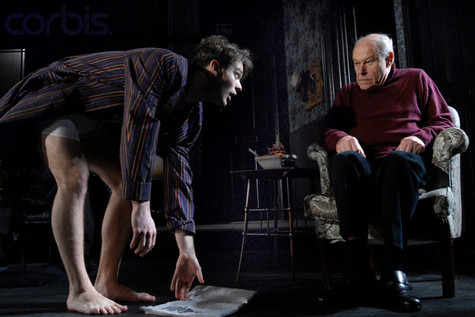
April 14, 2008
Charlie Cox could be forgiven for choosing the allure of Hollywood over the daily grind of the West End. It's both bracing and somewhat surprising, then, to find the 25-year-old star of the fantasy adventure film, Stardust, not to mention the Al Pacino Merchant of Venice and Heath Ledger vehicle Casanova before that, on stage at the Comedy Theatre in a Harold Pinter double bill, The Lover and The Collection.
It’s Cox's second-ever professional stage gig following a Southwark Playhouse production three years ago of Tis Pity She's A Whore. In the first of the two Pinters, both dating to the early 1960s, Cox makes a cameo appearance as a milkman suggestively delivering cream to the home of the adulterous (or is she really?) Gina McKee. But it's The Collection that tests the young actor's chops, playing both the boy toy of older gent Timothy West as well as a possible bedmate of McKee's Stella. (The truth, as so often in Pinter, is teasingly elusive.)
The supremely open and affable Cox chatted to Broadway.com one recent Saturday before that day's two shows about his West End debut, fielding those famous Pinter pauses, and why the fame that surely awaits him is also in some way terrifying.
So, here you are nearing the final stretch of a four-month West End run when surely the demand for you to stick with movies must be intense.
I suppose, and there is a way in which this was the first real decision that I had to make, since I was offered a film at the same time as this play. But the truth of the matter is, when you start out acting, you take any job you can get. A lot of young actors nowadays are being forced into film and into fame, and they're not any better than when they started. And I've always thought the best possible scenario for my life and my career is longevity, and the theater has to be part of that.
But don't agents go, "You can't give over 16 weeks to lesser-known Pinter when you could be doing movies?"
It depends on who the agent is. My agent in England [Lindy King] is incredibly understanding. There is no such thing as "can" or "can't." She sees the bigger picture. I mean, obviously, she will advise me as to what she thinks is best for my career, but that's precisely why this appealed to me so much. I hope to do much more theater. I love it. I've had a fabulous time all the way through.
When you did Tis Pity at the Southwark Playhouse in 2005, that was only a three-week run. How have you found the eight-show-a-week routine over the past few months?
It's interesting: After rehearsals, a lot of the work is done, and you don't have to come into work and face new challenges as you often do on a film. I'm finding that when you do a long run, you have to go places you've never been before to keep the material fresh, and that's working with some very seasoned actors in both film and theater: Timothy West, Gina McKee... I will go through a period of four or five days when I feel I can't deliver, but then something happens that brings you out of any possible rut. It's about finding new ways of being able to hear it each night.
I'm sure the fact that it's Pinter is a major plus.
Yes, especially that it's Pinter. The words he uses are so precise and so brilliant and so perfect for their placement within a script that when we first started, I thought, I can't do this without a dictionary.
What about those celebrated Pinter pauses? Are they tricky to navigate?
Well, we have to remember that Pinter was an actor first and foremost, and he is there to help the actor in his writing. There's become this belief that you have to tap out the pauses, but he'll openly admit that is absolute bollocks. With Harold, the punctuation is even more important than the pauses and the silences.
Did Pinter come to rehearsals?
He came on three different occasions, and I was kind of all right with it. Gina and Rich were really, really scared. He had very, very few notes: he gave me some areas where I could slow down a bit.
It must be fun priming yourself for the intrigue of The Collection with your brief encounter with Gina in The Lover.
The two plays do work surprisingly well together in that Harold's characters tend to do battle with the same power struggle. But let's be honest: the milkman could be done by anyone; it's kind of embarrassing, actually. What happened was that Jamie [the plays' director, Jamie Lloyd] gave me the script and said that there's a small character in The Lover who's normally played by the person who plays Bill in The Collection: that made a lot of sense to me.
You began in theater with a Jacobean writer, John Ford. Do you see any Shakespeare in your stage future, especially having appeared with Al Pacino on screen in The Merchant of Venice?
I'd love to, though I don't find it very easy. I know there are some people who find that doing Shakespeare is just like chatting but I'm much more comfortable doing something more modern. I don't feel natural when playing royal monarchs [Laughs.]
You worked with the late Heath Ledger on Casanova and his awful death must prompt all sorts of questions about the price of fame.
God yes, though you'd never have encountered anyone genuinely kinder or less driven by ego than Heath. But I can honestly tell you that I never got into [this profession] for money or anything like that. Fame terrifies me to my very soul, I just fucking hate it. It makes me incredibly anxious.
You've clearly got a genuine sense of perspective, so I'm sure you'll deal with it just fine. What's next, once the play ends?
I've got a month off and then I'm off to Los Angeles to do another movie with Al Pacino, who this time is playing my dad, who is being taken off life support. It's called Lullaby, and the whole thing takes place in a hospital room; it's a dark comedy, actually.
~*~
#ah another new-to-me old interview! 😀#I'm puzzled by his last response since we know no such movie exists#was there going to be one and it just fell through at the last minute?#or did he just jokingly make that up on the spot? lol#other interesting tidbits as well ^.^;#''Rich'' being a reference to Richard Coyle#and yes my brain is still gleefully trying to process the idea of Charlie and Faustus Blackwood sharing a stage for uh...reasons jlakjlfka#charlie cox#bill lloyd#timothy west#the lover and the collection#theatre#harold pinter#jamie lloyd#heath ledger#baby charlie#interview#article
16 notes
·
View notes
Text
The press release about the Merrily We Roll Along extension, which also includes casting information for the two new swings and the two actors playing Frank Jr.
"MERRILY WE ROLL ALONG" IS EXTENDED BY POPULAR DEMAND NOW THROUGH MARCH 24, 2024 STARRING DANIEL RADCLIFFE JONATHAN GROFF AND LINDSAY MENDEZ
DIRECTED BY OLIVIER AWARD® WINNER MARIA FRIEDMAN THE WILDLY ANTICIPATED BROADWAY TRANSFER OF MS. FRIEDMAN'S HUGELY ACCLAIMED MENIER CHOCOLATE FACTORY & NEW YORK THEATRE WORKSHOP PRODUCTION OF STEPHEN SONDHEIM AND GEORGE FURTH'S BELOVED AND ETERNALLY CELEBRATED MUSICAL BEGINS PERFORMANCES ON TUESDAY, SEPTEMBER 19, 2023 AT THE HUDSON THEATRE
TICKETS FOR THE EXTENSION ON SALE BEGINNING TODAY AT 10:00AM ET FROM $69
New York, NY (July 10, 2023) – Producers Sonia Friedman Productions, David Babani, Patrick Catullo, and Jeff Romley announced today that the first ever Broadway revival of Stephen Sondheim and George Furth's Merrily We Roll Along has extended its engagement by popular demand. Originally announced to run through January 21, 2024, Merrily We Roll Along will now run through March 24, 2024, with performances beginning on Tuesday, September 19, 2023 at the Hudson Theatre (141 W 44th Street). Directed by multi-Olivier Award® winner Maria Friedman, Merrily We Roll Along features music & lyrics by Stephen Sondheim, a book by George Furth, and is based on the original play by George S. Kaufman & Moss Hart.
As previously announced, Merrily We Roll Along will star Daniel Radcliffe as Charley Kringas, Jonathan Groff as Franklin Shepard, and Lindsay Mendez as Mary Flynn.
Tickets for the new dates will be available at 10:00am ET today, Monday, July 10 at MerrilyOnBroadway.com.
Tickets will be available from $69. A TodayTix Lottery will be available for all performances, with details to be announced at a later date.
Additionally, the production will feature Krystal Joy Brown as Gussie Carnegie, Katie Rose Clarke as Beth Shepard, and Reg Rogers as Joe Josephson. The cast will also include Max Rackenberg, Brady Wagner, Sherz Aletaha, Maya Boyd, Leana Rae Concepcion, Morgan Kirner, Ken Krugman, Corey Mach, Talia Robinson, Amanda Rose, Jamila Sabares-Klemm, Brian Sears, Evan Alexander Smith, Christian Strange, Koray Tarhan, Vishal Vaidya, Natalie Wachen, and Jacob Keith Watson.
The production recently enjoyed a critically acclaimed and completely sold-out run at New York Theatre Workshop, after its sold-out runs at London's Menier Chocolate Factory and the Olivier Award-winning West End transfer produced by Sonia Friedman Productions.
Spanning three decades in the entertainment business, Merrily We Roll Along charts the turbulent relationship between composer Franklin Shepard and his two lifelong friends — writer Mary and lyricist & playwright Charley. An inventive cult-classic ahead of its time, Merrily We Roll Along features some of Stephen Sondheim's most celebrated and personal songs. Maria Friedman first directed the musical at London's Menier Chocolate Factory – a production that subsequently transferred to the Harold Pinter Theatre, where it garnered the most five-star reviews in West End history before going on to win the Olivier Award for Best Musical Revival. Merrily We Roll Along will be produced on Broadway by Sonia Friedman Productions, David Babani, Patrick Catullo, Jeff Romley, and New York Theatre Workshop. This production was originally produced at the Menier Chocolate Factory (Artistic Director David Babani) and subsequently produced in London's West End by Sonia Friedman Productions, Menier Chocolate Factory, and Neal Street Productions.
Merrily We Roll Along also features choreography by Tim Jackson, orchestrations by Tony Award winner Jonathan Tunick, scenery and costume design by Soutra Gilmour, lighting design by Amith Chandrashaker, sound design by Kai Harada, hair and wig design by Cookie Jordan, casting by Jim Carnahan, CSA and Jason Thinger, CSA, music supervision by Catherine Jayes, music direction by Joel Fram, associate music supervision by Alvin Hough, Jr., and music coordination by Kristy Norter. Merrily We Roll Along was originally directed on Broadway by Harold Prince and originally produced on Broadway by Lord Grade, Martin Starger, Robert Fryer, and Harold Prince in association with Ruth Mitchell and Howard Haines.
10 notes
·
View notes
Text


Andrew Garfield and Tamsin Greig at the "Pinter At The Pinter" Pinter Five & Six - Press Night - After Party | January 4, 2019
#andrew garfield#hello gorgeous#so handsome#apperance#pics#why so fucking sexy#andrew please#have mercy on me#peter parker#spider man#andrew garfield peter parker#andrew garfield spiderman#andrew peter parker#andrew peter#andrew spiderman#tasm#tasm peter#tasm peter parker#the amazing spider man#under the banner of heaven#jeb pyre#tick tick boom#jonathan larson#sincericida#tamsin greig
18 notes
·
View notes
Text
Interview, well it´s more like a questionaire under the cut :-)
Dame Penelope Wilton: ‘My worst holiday was in Scotland’
The actress, 76, on tenacity, boarding schools and collecting art for the sake of it
Penelope Wilton is a multi-award-winning actress across stage and screen, who is best known for her role as Isobel Crawley in ITV’s Downton Abbey. Twice divorced, she has a daughter and two grandchildren, and lives in London.
Best childhood memory?
I was five and my parents were moving house, so I was sent to stay with a great-aunt in Harrogate, as it was too much for my mother to look after me as well as my two-year-old sister Linda and my older sister Rosemary during the move. When it was time for me to go home, I was put on the train with the guard in his van. I then had to change trains at a station where my father was going to meet me. He ran down the platform and picked me up and I had him to myself for the whole journey on the other train. I was in heaven at the thrill of it all, because I adored him. To me, there was nothing more wonderful, as I was selfish about sharing him with my two sisters.
Best subject at school?
History, which I still like now. I was never very good at school as I was slightly dyslexic, so my written work was frightful, but I really enjoyed history and still love good period biographies. As a little girl, I had gone to an extremely good convent school. But because my mother became ill, I then went to two terrible boarding schools with not very good teachers; anything I’ve learnt, I’ve taught myself. So I’ve always had a slight inferiority complex about my education. However, being an actor is a fascinating education in itself, as you are researching everything you do. So it set me on a path to find out about things.
Best trait?
Tenacity: you have to stick with things, as a career, and life itself, obviously has its ups and downs. I almost gave up acting in my 20s as one theatre director was such a bully. I was so demoralised, because you’re not confident when you’re young – or I certainly wasn’t. I was also diminished by authority at school, but the experiences taught me that you have to fight that tyranny. Bullies like that don’t exist now in my industry; people nowadays wouldn’t put up with it.
Best possession?
I can’t say my daughter and grandchildren because I don’t possess them, even though they are the most important things in my life. But I have a number of paintings of which I’m fond, particularly one by Winifred Nicholson. It’s a picture of Brittany with two Breton ladies, and a little white and grey house with a sandy track in front. It’s very charming and restful to look at. I collect art for its own sake: when I’ve made a bit of money, I buy a painting rather than anything else. Although I can’t buy any more as I can’t fit them in my house.
Best decision?
Having my daughter, Alice, who was quite a survivor as a baby. I’ve got a very nice son-in-law and two lovely grandchildren. Daniel is 10 and Ella is six; they show no sign of the acting gene, but she’s a good painter and he’s good at writing stories.
Best film/play?
The best film when I was a child was Jacques Tati’s Monsieur Hulot’s Holiday. The ones I’ve liked best as an adult are by Scorsese and Spielberg. I’ve just watched The Godfather again, such a marvellous film. And anything with the late Lino Ventura in it, the Italian actor who starred in many French films. He was heaven. As for plays, I’m very fond of Shakespeare’s Much Ado About Nothing – I’ve played Beatrice – and also Harold Pinter’s Betrayal, Terence Rattigan’s The Deep Blue Sea and Christopher Hampton’s The Philanthropist.
Best moment?
When I saw my daughter for the first time; she’s a theatre producer now. My first child, a boy, had been stillborn at 29 weeks. And Alice was only 2lb 9oz when she was born at 30 weeks, but she survived and it was wonderful: the best production of all.
Worst childhood memory?
Being sent away to school when I was eight and then again when I was 11. I told my parents I hated it, but my mother was very ill and couldn’t cope with the three of us girls. I was too cowed by authority at the time; and I could only go home at half term, which was just a long weekend, anyway. You did get letters from your family, though – and eventually I got used to it. But there was never any chance of me sending my daughter to board, though I think Daniel would be happy to do so now, because he’s very sociable.
Worst habit?
I’m very anxious about timekeeping, so I’m always very early and make a fuss if I think I’m going to be late. It’s because of what I do: as an actor, if you’re late, missing your cue is the worst thing that can happen to you. The play can’t start until you’re all there – you can’t phone in your performance. It’s a nightmare. I even got lost once on the way to the theatre.
Worst subject at school?
I never got the hang of maths: it was because of the teaching, they weren’t very good. It’s a very logical subject, so you mustn’t miss a brick in the building. I would still like to master it one day.
Worst job?
A television drama called The Song of Songs, in 1973: it was about the demimonde in Vienna at the turn of the last century. The director was a terrible bully – another one – and a horrible man. My drama school, the Drama Centre London, had taught me to stand up for myself and have a voice, but that wasn’t allowed on this set. And the rest of the cast were mostly much older than me.
Worst holiday?
I went to Scotland as a young teenager with my family because my father loved fishing, but it rained the entire time. We traipsed round historic houses a lot as there was nothing else to do while it rained so incessantly. It wasn’t completely horrible as we were together as a family – and Dad had a lovely time because the weather was good for catching fish. But if you’re an adolescent, castles get a bit boring.
Worst thing about modern life?
The extremes: no one seems to listen to anybody else. There’s no compromise, even though life is about compromise. Social media is a wonderful thing in some respects, but not when it’s having a malign influence on young people. I’m on WhatsApp for the family, but generally it wastes time when I could be doing something else. As for mobile phones, people are better about turning them off in the theatre now, but it used to happen a lot – and it was incredibly offputting when they went off. I would find my voice rising to try to hide the sound.
The absolute worst?
The loss of my elder sister Rosemary 18 months ago from the effects of Covid was the worst, because your sibling is in your life the longest of all your family members. Her death is still very fresh to me, so these are sad times. She was seven years older than me and had started to fall a lot, so she was not in a good state to catch Covid. Although she actually got over the virus, she had to go into hospital because her breathing was not good – and she caught a chest infection there. She was a brilliant woman and a wonderful television producer for the BBC’s Arena arts programmes, such as The RKO Story.
6 notes
·
View notes
Text
Happy Birthday 🎂 🥳 🎉 🎈 🎁 🎊 To You
The Redheaded 🦰🇬🇧 Ginger English Actor Of The Gryffindor House 🦁🏠 Of Hogwarts & Best Friend To The Legendary Wizard himself Mr. Harry Potter 🤓⚡ 🧙♂️🪄✨
Born On August 24th, 1988
Hailing All The Way From Harlow, Essex
He was born on 24 August 1988 in Harlow, Essex, to Nigel Grint, a dealer in racing memorabilia, and Joanne Grint (née Parsons). He is the eldest of five siblings. He has said that his earliest goal in life was to become an ice cream man. He grew up in Watton-at-Stone, Hertfordshire, and was educated at Richard Hale School, in Hertford.
He is an English actor. Grint rose to fame for his role as Ron Weasley in the Harry Potter film series, for which he was cast at age eleven, having previously acted only in school plays and his local theatre group. Since then, he has continued his work on film, television, and theatre.
Beginning in 2002, he began to work outside of the Harry Potter franchise, with a co-leading role in Thunderpants. He starred in the dramedy Driving Lessons (2006) and the drama Cherrybomb (2009) and co-starred in the comedy Wild Target (2010). After the Harry Potter series concluded, he appeared in the films Into the White (2012), Charlie Countryman (2013), CBGB (2013), and Moonwalkers (2015). He made his stage debut in 2013 in Mojo at the Harold Pinter Theatre. He executive-produced and starred in the television series Snatch, based on the film of the same name. He has also starred in the black comedy series Sick Note, the mystery thriller miniseries The ABC Murders, and the psychological horror series Servant.
Please Wish This Iconic Ginger English 🇬🇧 Actor🦰Of Gryffindor🦁 That Everyone Knows & Loves, A Very Happy Birthday 🎂 🥳 🎉 🎈 🎁 🎊
You Know Him
You Love Him
& You Can't Help But Enjoy His Sense Of British Wit & Humor since 2001
THE 1 & ONLY
MR. RUPERT ALEXANDER LLYOD GRINT AKA MR. RONALD WEASLEY 🦰🪄 OF GRYFFINDOR HOUSE 🦁🏠 FROM THE HARRY POTTER MOVIE SERIES 🤓⚡🧙♂️🪄✨
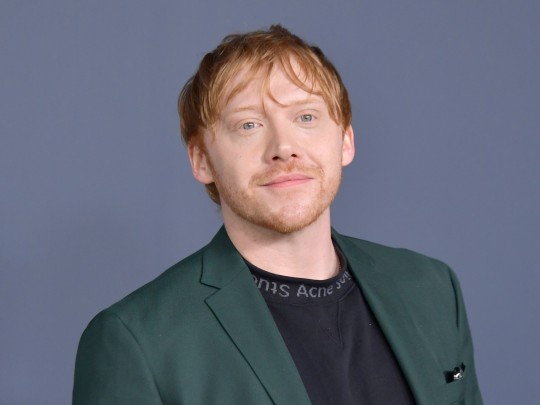
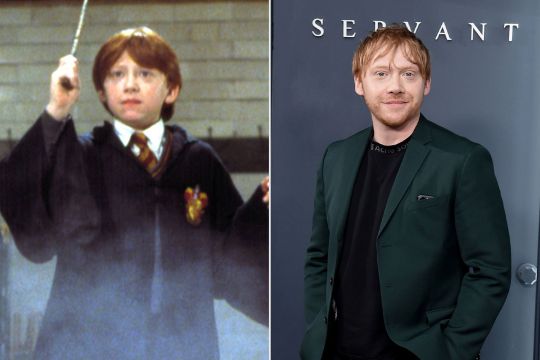

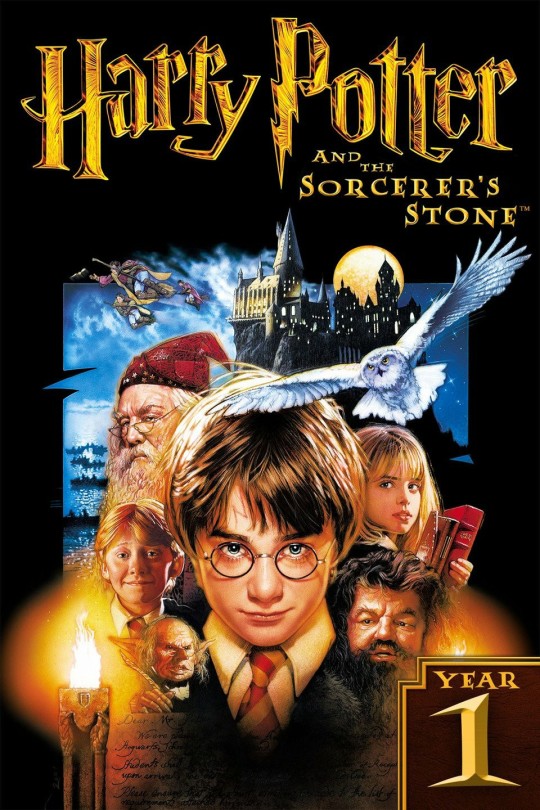
HAPPY 35TH BIRTHDAY 🎂 🥳 🎉 🎈 🎁 🎊 TO YOU MR. GRINT & HERE'S TO MANY MORE YEARS TO COME #RupertGrint #RonaldWeasley #HarryPotter
2 notes
·
View notes
Text

Courtesy Pierre Dalous. A Griffon Vulture — Besties Not Pictured — In Flight.
Like People, Vultures Get Set In Their Ways And Have Fewer Friends As They Age
Older Birds Tend To Have More Selective Friendships With Stronger Bonds and May Know Better Where To Find Food
— By Holly Ober | August 29, 2024
Key Takeaways:
Young griffon vultures move frequently between sleeping sites in different locations, interacting with many friends.
They get set in their ways as they age and roost in the same spots with the same individuals; older vultures follow the same paths.
Roosts act as information hubs; older vultures may have a more thorough knowledge of where to find food resources and less need to learn about them from other vultures.
If you’d rather be watching TV on your couch than dancing at the club, you might have something in common with aging griffon vultures. New research shows that young griffon vultures move frequently between sleeping sites in different locations and interact with many friends but get set in their ways as they age, roosting in the same spots with the same individuals. As moving between roosts becomes a grind, older vultures follow the same path, establishing movement routines, that are not seen in young vultures.
Younger vultures shy away from the most popular roosts, suggesting they might be intimidated by the older ones or that there’s a vulture equivalent of “Hey you kids, get off my lawn.”
The research, published in Proceedings of the National Academy of Sciences, shows that like many people, older vultures tend to have fewer, more selective friendships with stronger bonds. They may also have a more thorough knowledge of where to find food resources.
Eurasian griffon vultures, or Gyps fulvus, are large vultures that live in the Mediterranean, the Middle East and India. With wingspans up to 9 feet, they’re much larger than North American turkey vultures and bigger than bald eagles.
Finding food can be tricky for vultures because it depends on locating animal carcasses — an unpredictable and ephemeral source. When griffon vultures find a carcass, they tend to sleep or roost nearby and feed on it over a period of days. Roosting sites can thus be ‘information hubs,’ where vultures that recently fed signal to others about food sources; they then follow each other to carcasses and form friendships that help them stay in the loop about food.
The researchers wanted to know if an individual griffon vulture’s movement patterns and social behavior changed over the course of its life. They used GPS data from 142 individually tagged birds in Israel gathered over a period of 15 years to cross-reference the vultures’ ages with their movement and social interactions at roost sites.
“What we found was as they age, their loyalty to certain roost sites increases,” said co-author Noa Pinter-Wollman, a UCLA professor of ecology and evolutionary biology. “Young vultures check out many different roosts but in middle age, they start going repeatedly to the same places.”
The study showed young vultures sometimes returned to the same roost but usually chose different ones, rarely spending two nights in the same place. From young adulthood at around 5 years old through middle age, they spent about half their nights at the same “home” site and half elsewhere. In old age, they became true homebodies.
“When they are old, from the age of 10 onward, they no longer have the energy to be ‘out and about’ and return consistently to the same site,” said corresponding author Orr Spiegel of Tel Aviv University. “Those who were adventurous at the age of 5 became more sedentary by age 10.”
As the vultures grew older, the strength of their social bonds decreased as well for at least part of the year. The number of individuals they interacted with didn’t change with age — if they had five friends when young, they still had five when older. But the amount of time they spent with vultures outside of their close friend group plummeted. Older vultures spent most of their time with and roosted mostly with these close friends. Their movements also became more routine, eventually following a predictable pattern.
The study is unique because the researchers were able to track the movements and social behaviors of the same vultures for up to 12 nearly consecutive years over a 15-year period.
“We are able to show that the trends of individuals becoming more loyal to the same sites with age is not because the more exploratory individuals die earlier and live shorter lives, and the older, more sedentary individuals live longer lives,” said first author and Tel Aviv University postdoctoral fellow Marta Acácio. “Individuals actually change their behavior with age, and this has rarely been shown in nature for long-lived birds due to the difficulty of tracking individuals for such a long time.”
The research backs up findings from studies in other species that, with age, animals become more faithful to their known sites and routines — and potentially become more selective in their social relationships. These behaviors are commonly attributed to aging in humans and can help improve understanding of how animal populations move about in their environments and relate to other members of their species, as well as identify better ways to protect them from threats. For griffon vultures, this could mean better protection of important roosting sites and using knowledge about their social interactions to reduce the risk of poisoning.
“It looks like they just get set in their ways,” Pinter-Wollman said. “They’ve gathered information over the years, and they might as well use it. Carcasses are hard to come by and roosts are information hubs. Some roosts become popular for a reason; for example, they tend to be closer to reliable food sources and older vultures potentially monopolize these roosts.”
#Vultures#Holly Ober#NewsRoom.UCLA.Edu#Research#Behavior#Science#Scientists#Biological Sciences#Science & Technology
0 notes
Note
Imagine working at Pinter's company as the media and communication specialist. Reader handles the socials and any communication that is needed. What if she makes a major mistake (or perhaps he hacks and makes it appear that she does) and Pinter is her boss. So the logical thing is to go to him for help.
"I-I, Sir, I don't know how this happened and I-" a sob as tears roll down your cheeks, "What do I do?" Your voice wavers while you glance from the floor to his face.
The slime leans forward on his chair to rest his head on a hand before he replies, "First thing, Pet, you will no longer work as our media and communication specialist. You're clearly not qualified to do this job. Nor are you good at it." Pinter stands from his chair and saunters over to you peering down at you, "You'll be my little assistant from here on out."
He's enjoying this. He really is. He's wanted you for so long and now he has you after carefully laying a trap. Pinter plans to keep you in a golden cage to watch over you, his pretty little bird.
I know it's not long or well written but I hope this finds you well. I love Pinter and am actually five months away from from getting my bachelor's of Science in Media and Communication. So I felt inspired.
Oooh, nice! 🤍
Pinter isn't really a "pet" kind of person, he's also the kind to be slightly less abrasive. Like, he lets you know that you'll be his assistant from then on, but he'll use terminology that sounds positive, even though you can read the threat in his voice. I'm not sure if that makes sense, but yeah.
44 notes
·
View notes
Text
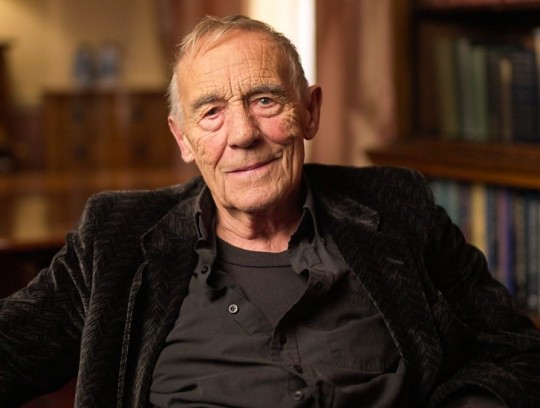
The actor Michael Jayston, who has died aged 88, was a distinguished performer on stage and screen. The roles that made his name were as the doomed Tsar Nicholas II of Russia in Franklin Schaffner’s sumptuous account of the last days of the Romanovs in Nicholas and Alexandra (1971), and as Alec Guinness’s intelligence minder in John Le Carré’s Tinker Tailor Soldier Spy on television in 1979. He never made a song and dance about himself and perhaps as a consequence was not launched in Hollywood, as were many of his contemporaries.
Before these two parts, he had already played a key role in The Power Game on television and Henry Ireton, Cromwell’s son-in-law, in Ken Hughes’s fine Cromwell (1969), with Richard Harris in the title role and Guinness as King Charles I. And this followed five years with the Royal Shakespeare Company including a trip to Broadway in Harold Pinter’s The Homecoming, in which he replaced Michael Bryant as Teddy, the brother who returns to the US and leaves his wife in London to “take care of” his father and siblings.
Jayston, who was not flamboyantly good-looking but clearly and solidly attractive, with a steely, no-nonsense, demeanour and a steady, piercing gaze, could “do” the Pinter menace as well as anyone, and that cast – who also made the 1973 movie directed by Peter Hall – included Pinter’s then wife, Vivien Merchant, as well as Paul Rogers and Ian Holm.
Jayston had found a replacement family in the theatre. Born Michael James in Nottingham, he was the only child of Myfanwy (nee Llewelyn) and Vincent; his father died of pneumonia, following a serious accident on the rugby field, when Michael was one, and his mother died when he was a barely a teenager. He was then brought up by his grandmother and an uncle, and found himself involved in amateur theatre while doing national service in the army; he directed a production of The Happiest Days of Your Life.
He continued in amateur theatre while working for two years as a trainee accountant for the National Coal Board and in Nottingham fish market, before winning a scholarship, aged 23, to the Guildhall School of Music and Drama in London, where he was five years older than everyone else on his course. He played in rep in Bangor, Northern Ireland, and at the Salisbury Playhouse before joining the Bristol Old Vic for two seasons in 1963.
At the RSC from 1965, he enjoyed good roles – Oswald in Ghosts, Bertram in All’s Well That Ends Well, Laertes to David Warner’s Hamlet – and was Demetrius in Hall’s film of A Midsummer Night’s Dream (1968), with Warner as Lysander in a romantic foursome with Diana Rigg and Helen Mirren.
But his RSC associate status did not translate itself into the stardom of, say, Alan Howard, Warner, Judi Dench, Ian Richardson and others at the time. He was never fazed or underrated in this company, but his career proceeded in a somewhat nebulous fashion, and Nicholas and Alexandra, for all its success and ballyhoo, did not bring him offers from the US.
Instead, he played Charles Lutwidge Dodgson (Lewis Carroll) in Alice’s Adventures in Wonderland (1972), a so-so British musical film version with music and lyrics by John Barry and Don Black, with Michael Crawford as the White Rabbit and Peter Sellers the March Hare. In 1979 he was a colonel in Zulu Dawn, a historically explanatory prequel to the earlier smash hit Zulu.
As an actor he seemed not to be a glory-hunter. Instead, in the 1980s, he turned in stylish and well-received leading performances in Noël Coward’s Private Lives, at the Duchess, opposite Maria Aitken (1980); as Captain von Trapp in the first major London revival of The Sound of Music at the Apollo Victoria in 1981, opposite Petula Clark; and, best of all, as Mirabell, often a thankless role, in William Gaskill’s superb 1984 revival, at Chichester and the Haymarket, of The Way of the World, by William Congreve, opposite Maggie Smith as Millamant.
Nor was he averse to taking over the leading roles in plays such as Peter Shaffer’s Equus (1973) or Brian Friel’s Dancing at Lughnasa (1992), roles first occupied in London by Alec McCowen. He rejoined the National Theatre – he had been Gratiano with Laurence Olivier and Joan Plowright in The Merchant of Venice directed by Jonathan Miller in 1974 – to play a delightful Home Counties Ratty in the return of Alan Bennett’s blissful, Edwardian The Wind in the Willows in 1994.
On television, he was a favourite side-kick of David Jason in 13 episodes of David Nobbs’s A Bit of a Do (1989) – as the solicitor Neville Badger in a series of social functions and parties across West Yorkshire – and in four episodes of The Darling Buds of May (1992) as Ernest Bristow, the brewery owner. He appeared again with Jason in a 1996 episode of Only Fools and Horses.
He figured for the first time on fan sites when he appeared in the 1986 Doctor Who season The Trial of a Time Lord as Valeyard, the prosecuting counsel. In the new millennium he passed through both EastEnders and Coronation Street before bolstering the most lurid storyline of all in Emmerdale (2007-08): he was Donald de Souza, an unpleasant old cove who fell out with his family and invited his disaffected wife to push him off a cliff on the moors in his wheelchair, but died later of a heart attack.
By now living on the south coast, Jayston gravitated easily towards Chichester as a crusty old colonel – married to Wendy Craig – in Coward’s engaging early play Easy Virtue, in 1999, and, three years later, in 2002, as a hectored husband, called Hector, to Patricia Routledge’s dotty duchess in Timberlake Wertenbaker’s translation of Jean Anouilh’s Léocadia under the title Wild Orchids.
And then, in 2007, he exuded a tough spirituality as a confessor to David Suchet’s pragmatic pope-maker in The Last Confession, an old-fashioned but gripping Vatican thriller of financial and political finagling told in flashback. Roger Crane’s play transferred from Chichester to the Haymarket and toured abroad with a fine panoply of senior British actors, Jayston included.
After another collaboration with Jason, and Warner, in the television movie Albert’s Memorial (2009), a touching tale of old war-time buddies making sure one of them is buried on the German soil where first they met, and a theatre tour in Ronald Harwood’s musicians-in-retirement Quartet in 2010 with Susannah York, Gwen Taylor and Timothy West, he made occasional television appearances in Midsomer Murders, Doctors and Casualty. Last year he provided an introduction to a re-run of Tinker Tailor on BBC Four. He seemed always to be busy, available for all seasons.
As a keen cricketer (he also played darts and chess), Jayston was a member of the MCC and the Lord’s Taverners. After moving to Brighton, he became a member of Sussex county cricket club and played for Rottingdean, where he was also president.
His first two marriages – to the actor Lynn Farleigh in 1965 and the glass engraver Heather Sneddon in 1970 – ended in divorce. From his second marriage he had two sons, Tom and Ben, and a daughter, Li-an. In 1979 he married Ann Smithson, a nurse, and they had a son, Richard, and daughter, Katie.
🔔 Michael Jayston (Michael James), actor, born 29 October 1935; died 5 February 2024
Daily inspiration. Discover more photos at Just for Books…?
13 notes
·
View notes